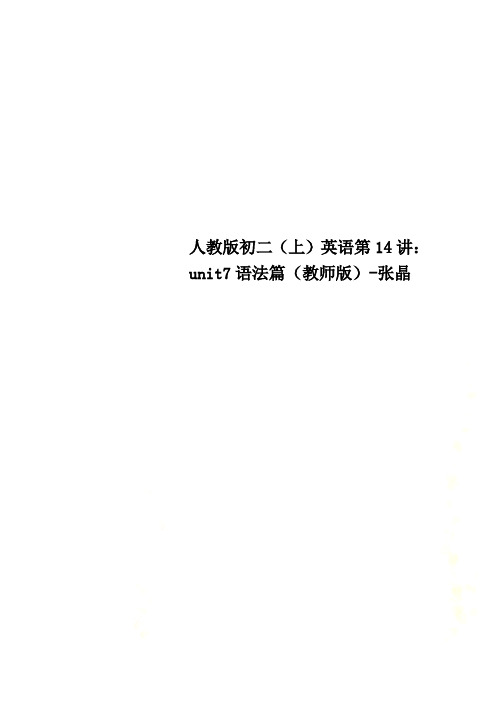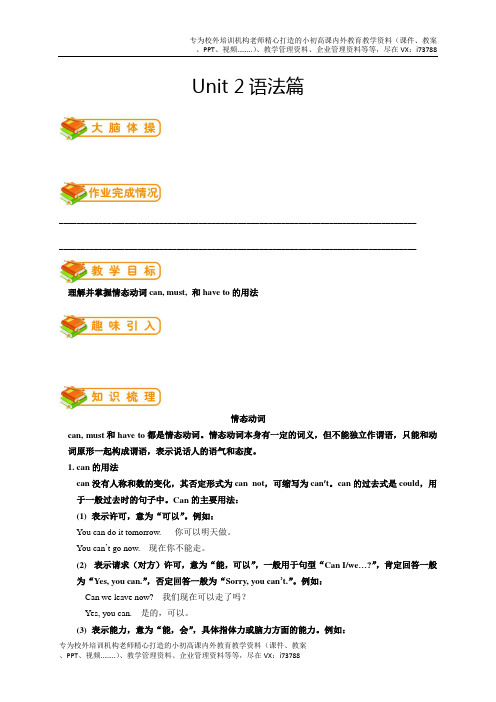1suz1yy000404初二英语刘智锋(2011年7月15日 2B语法专讲--时态) 付启明
- 格式:doc
- 大小:101.00 KB
- 文档页数:8


八年级上册英语语法知识点u7本篇文章将详细介绍八年级上册英语语法的第七个知识点——定语从句。
我们将会讨论定语从句的定义、分类、结构、用法以及注意事项。
一、定语从句的定义定语从句是修饰某个名词或代词的从句,通常用来说明被修饰的名词或代词的具体内容或特点。
比如,“The girl who is standing by the door is my sister.”这句话中的“who is standing by the door”就是一个定语从句,修饰了前面的名词“girl”。
二、定语从句的分类定语从句根据所修饰的名词或代词的不同,可以分为三种类型:1. 关系代词引导的定语从句关系代词是用来连接先行词和定语从句的代词,包括:who, whom, whose, which 和that。
例如:- The book that I borrowed from the library is very interesting.(我从图书馆借的那本书非常有趣。
)- The pen which I lost yesterday was my favorite.(我昨天丢失的那支笔是我最喜欢的。
)- The boy whom I met in the park is my neighbor.(我在公园里遇见的那个男孩是我的邻居。
)- The girl whose bag was stolen in the subway is crying.(那个在地铁里被偷包的女孩在哭。
)2. 关系副词引导的定语从句关系副词是用来连接先行词和定语从句的副词,包括:where, when, why。
例如:- This is the park where we often go for a walk.(这是我们经常去散步的公园。
)- That was the day when he left for America.(那是他去美国的那一天。

人教版初二(上)英语第14讲:unit7语法篇(教师版)-张晶要一个人过了)3. 表示一个人临时决定要做某事或意愿,可以用will 表达。
如:I will go to the lab to get some chemicals(化学药剂).I will help you if I have time tomorrow.4. shall和will 在口语的一些疑问句中相当于情态动词。
Shall一般与第一人称连用,will与第二人称连用。
如:Shall we go to the zoo next Saturday?(我们下周六去动物园好吗?)Will you please open the door for me?(替我把门打开好吗?)1.I ______(leave)in a minute. I ______(finish)all my work before I ______ (leave).2. —How long _____ you _____(study)in our country?—I _____(plan)to be here for about one more year.3. I ______(be)tired. I ______(go)to bed early tonight.4. Mary’s birthd ay is next Monday, and her mother_____(give)her a present.5. It is very cold these days. It ______(snow)soon.解析:1. 表示位置移动的词如:come, go, leave等多用一般现在时表将来,所以第一个空为am leaving,时间状语从句和条件状语从句中存在主将从现,所以第二,三空为will finish, leave2.根据答句“我计划在这再多呆一年”故知问句为“你将在我们国家呆多久?”计划,想及喜欢之类的词无将来时态,故此题答案为will ; study ; plan 3.根据本题的时间状语为tonight可知为将来时,故am ; will4.根据时间状语next Monday可知为将来时,故will give5.根据时间状语soon可知为将来时,故will snow基础演练1.There __________ a meeting tomorrow afternoon.A. will be going toB. will going to beC. is going to beD. will go to be2. Charlie ________ here next month.A. isn’t workingB. doesn’t workingC. isn’t going to workingD. won’t work3. He ________ very busy this week, he ________ free next week.A. will be; isB. is; isC. will be; will beD. is; will be4. There ________ a dolphin show in the zoo tomorrow evening.A. wasB. is going to haveC. will haveD. is going to be5. –________ you ________ free tomorrow?– No. I ________ free the day after tomorrow.A. Are; going to; willB. Are; going to be; willC. Are; going to; will beD. Are; going to be; will be6. Mother ________ me a nice present on my next birthday.A. will givesB. will giveC. givesD. give7. – Shall I buy a cup of tea for you?–________. (不,不要。


Unit 8 Section A grammar focus to 3c 教学重点:听懂谈论某人生日及日期的对话教学目标:掌握询问及回答他人的生日或年龄的日常用语教学难点:基数词变序数词和名词所有格的用法语法:序数词;名词所有格课前预习英汉互译1.第22 。
2.第26 .3.第31 .4 九月。
5.how about you? 。
6.生日 .7.第14 。
8.第十七 .小组合作单项选择。
1. Please turn to Page__and read the story.A. Ten; twoB. Ten; secondC. Tenth; secondD. Tenth; two2. Christmas Day is on___ _of December.A twenty-fiveB. the twenty-fiveC twenty-fifthD. the twenty-fifth3. -How old is Mary?.We had a special party for her birthday yesterday.A Twenty; twentythB. Twenty; twentiethC. Twenties; twentieth4. - What do you think of the environment here?-Wonderful! of the land_covered with trees and grass.A. Two fifths; isB. Two fifth;isC. Two fifths; areD. Two fifth; are5. Tom's watch is the same as his_A. brotherB. brothersC. brother'sD. brother'语法专练1.B句意:请翻到第10页读第2个故事。
习惯上使用基数词表示编号,序数词表示顺序,故选B。

Unit 2语法篇____________________________________________________________________________________________________________________________________________________________________理解并掌握情态动词can, must, 和have to的用法情态动词can, must和have to都是情态动词。
情态动词本身有一定的词义,但不能独立作谓语,只能和动词原形一起构成谓语,表示说话人的语气和态度。
1. can的用法can没有人称和数的变化,其否定形式为can not,可缩写为can’t。
can的过去式是could,用于一般过去时的句子中。
Can的主要用法:(1)表示许可,意为“可以”。
例如:You can do it tomorrow. 你可以明天做。
You can’t go now. 现在你不能走。
(2)表示请求(对方)许可,意为“能,可以”,一般用于句型“Can I/we…?”,肯定回答一般为“Yes, you can.”,否定回答一般为“Sorry, you can’t.”。
例如:---Can we leave now? 我们现在可以走了吗?---Yes, you can. 是的,可以。
(3)表示能力,意为“能,会”,具体指体力或脑力方面的能力。
例如:I can play basketball. 我会打篮球。
Can you sing well? 你唱歌唱得好吗?2. must和have to的用法must和have to都表示“必须”,其用法和区别如下:例如:We must study hard. 我们必须努力学习。
I had to borrow some money from my elder sister. 我不得不向姐姐借了一些钱。
北师版初二(下)英语第8讲:Unit4语法篇(教师版)Unless: conj. 除非, 如果不unless是从属连词,引导条件状语从句,含有否定意义,相当于if条件状语从句的否定形式。
unless = if not。
注意:unless引导的条件状语从句和if条件状语从句,与其它时间状语从句一样,用一般现在时代替将来时。
1. Unless you take more care, you’ll have an accident. 如果不多加小心的话,你会出事故的。
)2. My baby sister never cries unless she is hungry. 我那刚出生的妹妹除非饿了,否则她是从来不哭的。
3. Unless bad weather stops me, I jog every day. 除非坏天气阻拦我,否则每天我都慢跑的。
1. A tourist will easily lose his way in Beijing _______he has a map or a guide.A.if B.because C.unless D.when2. Studying in groups is necessary ________you want to do well in school.A.if B.until C.unless D.though3. --- I hear the famous singer Xu Song may come to Ningbo next month.--- Really?___________ he comes, my younger sister will be very excited.A.If B.Until C.Unless D.Before4. Please go shopping with me __________you have time.A.and B.but C.or D.if 5. Mum says ___________I do my homework now, I can watch TV for an hour tonight.A.if B.though C.because D.while解析:1.句意为"如果一名游客没有地图或者向导,他在北京会很容易迷路。
八年级英语下册Unit 8知识讲解Unit8hdn’tugetherasarf?【单元目标】Ⅰ.单词与短语suggestin hse enter advantage reeivebesides ent enurage present trendspeial albu persnal instead useperfet pan asleep prgress benhSeden native nearlfallasleep 入睡giveaa 赠送ratherthan 胜于hearf 听说suggest v提议;建议taeaninterestin 对……感兴趣aefriendsith 与……交友Ⅱ.目标句型:1hatshuldIgetfrsb…? 2Habutsth/dingsth?3Hduliesth?4hatabutsth/dingsth?hdn’tubu/get…? 6hntbu/get…?7The’retexpensive/heap/persnal…8Great!/Gdidea!/…I’llget/bu…9bestgiftis…10It’sgdfrsbt…11Itanaesb…Ⅲ.重点句型1hdn’tsbdsth? 2Habut结构3t…t结构【重点词汇】1iprve作不及物动词,表示“改进,改善”例如:Hisrisiprvingsll 他的工作提高得很慢。
Hishealthisiprving 他的健康正在好转。
也可作及物动词,表示“使某物改进,改善”。
例如:HestudieshardertiprvehisEnglish 他更加努力提高英语水平了。
ThisisntgdenughIanttiprveit 这还不够好,我要加以改进。
2reeber v记住,记起Ian’treeberurnae 我记不起你的名字。
AsfarasIanreeber,thisisthethirdtiee’veet我记得这是我们第三次会面了。
【强烈推荐】初二英语语法全真精讲讲义-CAL-FENGHAI.-(YICAI)-Company One1初二英语语法真题讲义主讲:王川欢迎使用新东方在线电子教材第二部分历届试题精选Unit 11. jack, good boy! Please pass ________ the glasses. I want to read the newspaper.A. youB. meC. himD. her2.This morning I had ________ egg and a bottle of milk for my breakfast.A. anB. aC. theD.不填冠词零冠词用法例句专有名词和不可数名词前ChinaThat letter is in her bag.名词已经有定语this, that, my,your, some, any等复数名词表示一类人或物My father and mother are teachers.星期、月份、季节、节日前It is Sunday today.称呼前What colour are Mrs. Green’s shoes?三餐和球类运动前He went to school before breakfast this morning.3. —How many ________ can you see in the following pictures?—Three.A. boysB. animalsC. filmsD. buildings4. Timmy goes to school ________ every day. It's 5 minutes' walk from his home to school.A. in a busB. by planeC. on footD. by boat5. Everything is ________ at night markets. You don't need a lot of money to have a good time.A. cheapB. badC. tiredD. dear6. —Excuse me, ________ is the nearest bookshop?—Go down the street and turn left at the second corner.A. howB. whatC. whereD. who7. The sign tells us ________.A. NO SMOKINGB. NO PARKINGC. NO PHOTOSD. NO FOOD8. —Can you play football?—Yes, I can, ________ I can't play it very well.转折关系A. orB. andC. soD. but9. Last month, students had to have their lessons by internet ________ because of SARS.A. on the playgroundB. at homeC. in the streetD. near the hospital10. It is ________ today than yesterday. Shall we go swimming this afternoon?A .the hottest B. hotC. hottestD. hotter最高级要加the,由于hot为重读闭音节所以要双写t加est。
精锐教育学科教师辅导讲义(2)讲义编号 11suz1yy000404学员编号:suz1zz40年级:初二课时数:3学员姓名:刘智锋辅导科目:英语学科教师:付启明课题牛津初中英语8B语法专讲——现在完成时授课日期及时段:2011.7.15(7月13日10:10——12:10)教学目标理解一般现在时、一般过去时和一般将来时的概念,并掌握这三种时态的用法教学内容Step 1 上次课作业讲解Step 2 语法讲解一、一般现在时:(一)一般现在时的功能:1、表示事物或人物的特征、状态。
The sky is blue.天空是蓝色的。
2、表示经常性或习惯性的动作。
I get up at six every day.我每天六点起床。
3、表示客观现实。
The earth goes around the sun.地球绕着太阳转。
(二)一般现在时的构成:1、be动词:主语+be(am,is,are)+其它。
如:I am a boy.我是一个男孩。
2、行为动词:主语+行为动词(+其它)。
如:We study English.我们学习英语。
当主语为第三人称单数(he, she,it)时,要在动词后加"-s"或"-es"。
Mary likes Chinese.玛丽喜欢汉语。
(三)一般现在时的变化1.、be动词的变化:A. 否定句:主语+ be + not +其它。
He is not a worker.他不是工人。
B. 一般疑问句:Be +主语+其它。
—Are you a student? —Yes. I am. / No, I'm not.C. 特殊疑问句:疑问词+一般疑问句。
Where is my bike?2、行为动词的变化:A. 否定句:主语+ don't( doesn't ) +动词原形(+其它)。
I don't like bread.He doesn't often play.B. 一般疑问句:Do( Does ) +主语+动词原形+其它。
—Do you often play football? —Yes, I do. / No, I don't.—Does she go to work by bike? —Yes, she does. / No, she doesn't.C. 特殊疑问句:疑问词+一般疑问句。
How does your father go to work?即学即练(一)用括号内动词的适当形式填空:1. He often ____ ____(have) dinner at home.2. Daniel and Tommy ____ ___(be) in Class One.3. We (not watch) TV on Monday.4. Nick (not go) to the zoo on Sunday.5. ______ they ________(like) the World Cup?6. What _______they often _______(do) on Saturdays?7. _______ your parents _______(read) newspapers every day?8. The girl _______(teach) us English on Sundays.9. She and I ________(take) a walk together every evening.10. There ________(be) some water in the bottle.11. Mike _______(like) cooking.12. They _______(have) the same hobby.13. My aunt _______(look) after her baby carefully.14. You always _______(do) your homework well.15. I _______(be) ill. I’m staying in bed.16. She _______(go) to school from Monday to Friday.17. Liu Tao _______(do) not like PE.18. The child often _______(watch) TV in the evening.19. Su Hai and Su Yang _______(have) eight lessons this term.20. -What day _______(be) it today? -It’s Saturday.二、一般过去时:(一)概说:1. 定义:表示过去某时发生的动作或存在的状态。
2. 结构:“主语+ 动词的过去式”(二)用法:1.表示过去某个时间发生的动作或存在的状态。
He was here yesterday.I got up at seven yesterday morning.2.表示过去经常或反复发生的动作。
My mother often went to work by taxi last year.3. 常与一般过去时态连用的时间有:at that time, then, at that moment, yesterday, yesterday morning (afternoon, evening…), last night (week, month, year…), 一段时间+ ago(several days ago), two days ago, a week ago, three years ago, in 1990, just now, long before, long long ago.(三)句型转化:1.be 动词的过去时的句型如下:1)否定句:主语+ be动词的过去式(was, were)+ not…2)疑问句:be动词的过去式(was, were)+ 主语…?a. He was busy yesterday. (肯定句) 他昨天很忙。
b. He was not busy yesterday. (否定句) 他昨天不忙。
c. Was he busy yesterday? (疑问句) 他昨天忙吗?d. There weren’t any boys in the room.房间里没有男孩儿。
e. Were there any boys in the room? 房间里有男孩儿吗?2.行为动词的否定式和疑问式:1)否定式:若肯定句中只有一个行为动词,那就得在行为动词前加上did not或缩略式didn’t,并把这个行为动词由过去式改为动词原形。
a. I called Lin Tao yesterday afternoon. →I did not / didn’t call Lin Tao yesterday afternoon.b. I borrowed a book from Sun Yang last Sunday. → I didn’t borrow a book from Sun Yang last Sunday.2) 一般疑问式:若在陈述句中只有行为动词的过去式,那就得在句首加上一个助动词did来帮助提问,然后把句中的行为动词由过去式改为动词原形,并在句末打上问号。
回答时别忘了还用did。
a. We stayed there for 10 days last month. → Did you stay there for 10 days last month? Yes, we did. / No, wedidn’t.b. Mary had a delicious dinner yesterda y evening. → Did Mary have a delicious dinner yesterday evening? Yes,she did. / No, she didn’t即学即练(一)用所给动词的适当形式填空。
1. We ______ (live) in Japan last year.2. Susan_______ (stop) the car on the street yesterday.3. My mother_______ (clean) my room and ______(study) for the English test last Sunday.4. What ______ you ______(do) last night?5. On Saturday morning I _____(play) football.6. May__________ (finish) her homework very late yesterday evening.7. Han Mei __________ (bring) her pet to the park that day.8. His father __________ (buy) a new computer for him last week.9. Miss Du__________ (walk) to work every day last term.10. We __________ (move) to Shenyang 8 years ago.11. __________ you __________ (have) bread for breakfast this morning?12. She __________ (give) me a nice present last night.13. The police __________ (stop) the car and __________ (catch) the thief (小偷) just now.14. Tom __________ (carry) water for the old man last Saturday.15. Uncle Wang _____________ ( come )into the room and __________ ( find ) something to eat.(二)选择:( )1.The two __________in the same class last year.A. areB. wasC. were( )2.---Where__________ you ? ----I went to buy some food for supper.A.are goB.did goC.do go( )3.The stud ents in Li Lei’s class__________ on a farm last week.A. workB. worksC. worked( )4.__________ that worker __________in a shoe factory a year ago?A. Do, workB.Did, workedC. Did, work( )5.---Have you found your pen ?----Yes, I__________ it two hours ago.A. foundB. findC. finded( )6. __ your mother ___ to work last Saturday?A. Did, goB. Do, goC. Does, go( )7.They_________not late the day before yesterday.A. didB. wereC. are( )8.__________ they away from school last October?A. DidB. WereC. Do( )9. __________you__________ to school last Sunday?A. Did, comeB. Do, comeC. Were, come( )10.What __________they__________ for breakfast last week?A. were, haveB. did, haveC. will, have三、一般将来时:(一)概念:表示将要发生的动作或存在的状态及打算、计划或准备做某事。